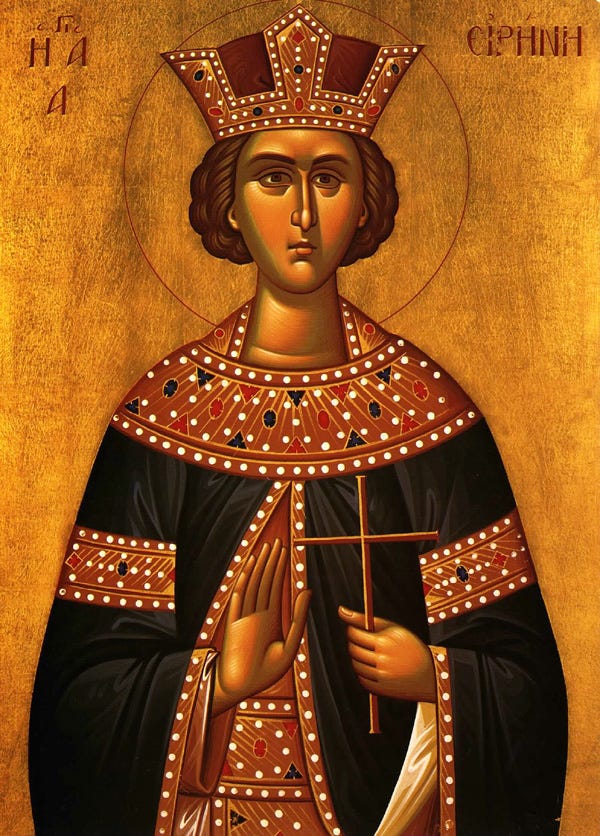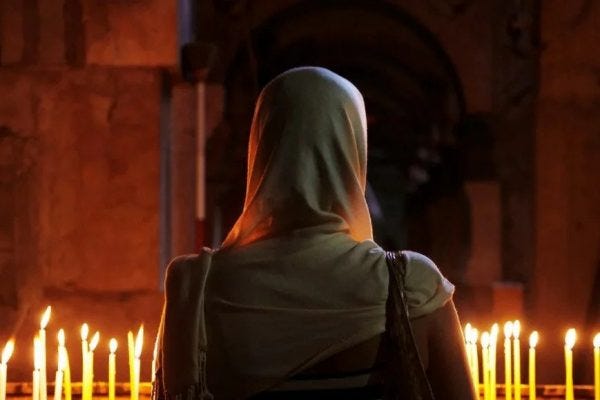“May God forgive me, but the world has become a huge madhouse. No one thinks of the next life anymore. All they want is more and more material goods. This is why they cannot find peace and run around constantly."
St. Paisios the Athonite
Acts 6:8-7:5, 47-60 (Epistle)
8 And Stephen, full of faith and power, did great wonders and signs among the people.
9 Then there arose some from what is called the Synagogue of the Freedmen (Cyrenians, Alexandrians, and those from Cilicia and Asia), disputing with Stephen.
10 And they were not able to resist the wisdom and the Spirit by which he spoke.
11 Then they secretly induced men to say, “We have heard him speak blasphemous words against Moses and God.”
12 And they stirred up the people, the elders, and the scribes; and they came upon him, seized him, and brought him to the council.
13 They also set up false witnesses who said, “This man does not cease to speak blasphemous words against this holy place and the law;
14 for we have heard him say that this Jesus of Nazareth will destroy this place and change the customs which Moses delivered to us.”
15 And all who sat in the council, looking steadfastly at him, saw his face as the face of an angel.
1 Then the high priest said, “Are these things so?”
2 And he said, “Brethren and fathers, listen: The God of glory appeared to our father Abraham when he was in Mesopotamia, before he dwelt in Haran,
3 and said to him, ‘Get out of your country and from your relatives, and come to a land that I will show you.’
4 Then he came out of the land of the Chaldeans and dwelt in Haran. And from there, when his father was dead, He moved him to this land in which you now dwell.
5 And God gave him no inheritance in it, not even enough to set his foot on. But even when Abraham had no child, He promised to give it to him for a possession, and to his descendants after him.
47 But Solomon built Him a house.
48 However, the Most High does not dwell in temples made with hands, as the prophet says:
49 ‘Heaven is My throne, and earth is My footstool. What house will you build for Me? says the LORD, or what is the place of My rest?
50 Has My hand not made all these things?’
51 You stiff-necked and uncircumcised in heart and ears! You always resist the Holy Spirit; as your fathers did, so do you.
52 Which of the prophets did your fathers not persecute? And they killed those who foretold the coming of the Just One, of whom you now have become the betrayers and murderers,
53 who have received the law by the direction of angels and have not kept it.”
54 When they heard these things they were cut to the heart, and they gnashed at him with their teeth.
55 But he, being full of the Holy Spirit, gazed into heaven and saw the glory of God, and Jesus standing at the right hand of God,
56 and said, “Look! I see the heavens opened and the Son of Man standing at the right hand of God!”
57 Then they cried out with a loud voice, stopped their ears, and ran at him with one accord;
58 and they cast him out of the city and stoned him. And the witnesses laid down their clothes at the feet of a young man named Saul.
59 And they stoned Stephen as he was calling on God and saying, “Lord Jesus, receive my spirit.”
60 Then he knelt down and cried out with a loud voice, “Lord, do not charge them with this sin.” And when he had said this, he fell asleep.
John 4:46-54 (Gospel)
46 So Jesus came again to Cana of Galilee where He had made the water wine. And there was a certain nobleman whose son was sick at Capernaum.
47 When he heard that Jesus had come out of Judea into Galilee, he went to Him and implored Him to come down and heal his son, for he was at the point of death.
48 Then Jesus said to him, “Unless you people see signs and wonders, you will by no means believe.”
49 The nobleman said to Him, “Sir, come down before my child dies!”
50 Jesus said to him, “Go your way; your son lives.” So the man believed the word that Jesus spoke to him, and he went his way.
51 And as he was now going down, his servants met him and told him, saying, “Your son lives!”
52 Then he inquired of them the hour when he got better. And they said to him, “Yesterday at the seventh hour the fever left him.”
53 So the father knew that it was at the same hour in which Jesus said to him, “Your son lives.” And he himself believed, and his whole household.
54 This again is the second sign Jesus did when He had come out of Judea into Galilee.
Great Martyr Irene (1st-2nd c.)
The holy Great Martyr Irene was born in the city of Magedon in Persia during the fourth century. She was the daughter of Licinius, the pagan ruler of a certain small kingdom, and his wife Licinia, and at birth her parents named her Penelope.
Penelope was very beautiful, and her father kept her isolated in a high tower from the time she was six so that she would not be exposed to Christianity. He also placed thirteen young maidens in the tower with her. An old tutor by the name of Apellian was appointed to give her the best possible education. Apellian was a Christian, and during her lessons, he told the girl about Christ the Savior and taught her about the Christian Faith and Christian virtues.
When Penelope reached adolescence, her parents began to think about her marriage. One night Penelope beheld the following vision: a dove entered the tower with an olive branch in its beak, depositing it on the table. An eagle also flew in carrying a wreath of flowers, and left it on the table. Then a raven flew in through another window and dropped a snake on the table. In the morning Penelope woke up and wondered about the meaning of the things she had seen. She related them to her tutor Apellian and he explained that the dove symbolized her superior education, and that the olive branch represented the grace of God which is received in Baptism. The eagle and the olive branch indicated success in her future life. The snake signified that she would experience suffering and sorrow.
At the end of the conversation Apellian said that the Lord wished to betroth her to Himself and that Penelope would undergo much suffering for her heavenly Bridegroom. After this Penelope refused marriage, was baptized by the priest Timothy, and he named her Irene (peace). She even urged her own parents to become Christians. Shortly after being baptized, she smashed all her father’s idols to pieces.
Since Saint Irene had dedicated herself to Christ, she refused to marry any of the suitors her father had chosen for her. When Licinius learned that his daughter refused to worship the pagan gods, he was furious. He attempted to turn her from Christ by having her tortured. She was tied up and thrown beneath the hooves of wild horses so that they might trample her to death, but the horses remained motionless. Instead of harming the saint, one of the horses charged Licinius, seized his right hand and tore it from his arm. Then it knocked Licinius down and began to trample him to death. This caused a great deal of confusion among the people there but Irene consoled them with the words of Christ: “All things are possible to the one who believes” (Mark 9: 23). And indeed, with wondrous faith, she prayed and through her prayers Licinius rose unharmed in the presence of many eyewitnesses with his hand intact. Then, Licinius and his wife were baptized as Christians, along with almost 3000 others who turned away from the worship of inanimate idols. Licinius abandoned his domain and lived in the tower he had built for his daughter. There he spent the rest of his life in repentance.
Saint Irene lived in the house of her teacher Apellian, and she began to preach Christ among the pagans, leading them to the path of salvation.
When Sedekias (Yesdegerd), the new prefect of the city, heard of the miracles performed by the saint, he summoned Apellian and questioned him about Irene’s manner of life. Apellian replied that Irene, like other Christians, lived in strict temperance, devoting herself to constant prayer and reading holy books. Sedekias summoned the saint to him and urged her to stop preaching about Christ. He also attempted to force her to sacrifice to the idols. Saint Irene staunchly confessed her faith before the prefect, not fearing his wrath, and prepared to undergo suffering for Christ. By order of Sedekias she was thrown into a pit filled with vipers and serpents. The saint spent ten days in the pit and remained unharmed, for an angel of the Lord protected her and brought her food. Sedekias ascribed this miracle to sorcery, and he subjected Saint Irene to many other tortures, but she remained unharmed. Under the influence of her preaching and miracles even more people were converted to Christ, and turned away from the worship of inanimate idols.
More than a Feeling
by FREDERICA MATTHEWES-GREEN
Last night found me yelling at the television once again over a panel discussion about “science and religion.” Both sides thought that rational processes can only take us so far in the journey to faith (agreed). After that, people turn to some other resource in order to connect with God (so far so good). What they use is their emotions.
Around my house, that’s when the sputtering starts. Only in the realm of religion is it assumed that every experience is a subjective experience, which means it’s an emotional projection—which means: Look, dear, a lunatic.
But in the real world, experience is just that: an experience. A few months ago I spent two weeks in Turkey. I experienced being in Turkey. When I tell people this, nobody nods kindly and assumes that I had an emotional experience that felt just like being in Turkey. In the real world, experience is expected to correspond to reality. Only when the topic is religion do people assume you’re talking about your feelings.
That little word, “feelings,” contributes to our confusion. We expect it to stretch over two divergent concepts, and don’t notice when we switch from one meaning to the other. This was evident, for example, in the “Star Wars” series. The soon-to-be bad guy, Anakin Skywalker, was warned not to be ruled by his “feelings,” his impulses of anger and vengeance. But the good guy, Luke, was encouraged to put more trust in his “feelings;” in that case, it meant his sense of connection with the Force.
The first kind of “feelings,” that is, emotional reactions, is something we can understand pretty well. We know what it’s like to be elated or furious, generous or spiteful. This kind of “feelings” arises as a response to something we perceive.
But then there’s the process of perception, and, confusingly, we use the word “feelings” here too. We can feel that autumn is coming, by some combination of our physical senses. We feel a change in the mood of a gathering, by a yet more subtle means. We are registering “feelings” all the time, through mind and body and an agile combination that seems to need a name of its own. Though many perceptions flow through us unnoticed, we can learn by discipline to raise them to awareness. Luke was urged to feel the presence of the Force-to gather his scattered senses and focus them on something just under the surface, something he had no prior experience of perceiving. He had to learn to recognize the Force, through concentrated attention. He had to trust his “feelings.”
This isn’t “feelings” in the emotional sense; these feelings aren’t reactions, but perceptions. (Luke may have felt emotional toward the Force, but that was after he felt the Force itself.) This second kind of “feelings” isn’t well-defined. Is it intuition? Is it a sixth sense? Is it new-age woo-woo flakiness?
Part of our problem is that we think people are solely made up of two equal-and-opposite faculties, reason and emotion. Reason is thought to be objective while emotion is subjective. So if God cannot be proven by reason, belief in him must be a private party. It must be an impulse that arises from emotion, powerful but untrustworthy, and applicable to nobody else. This is why religious people are regularly admonished that their beliefs are “true for you, but not for everybody.”
If reason and emotion are all we’ve got inside, there’s no room for that other kind of “feelings.” But in first-millennium Christian spirituality there’s another concept, that of the nous. This Greek word gets translated in our Bibles as “mind,” but there really is no English equivalent. It does not mean merely the rational intellect. The nous is like a radio inside each person that can receive impressions from God. It can receive any kind of impression, from anything; most of the time the nous is just wandering around looking for something to entertain or excite itself. At a minimum, the nous usually still receives impressions from God in the form of conscience. (You know you’re not just talking to yourself, because it’s saying things you don’t want to hear.) After it encounters something, the nous may react with a thought or an emotion, but those are secondary reactions. What comes first is the encounter.
First-millennium Christians understood their task as submitting the whole person to the transforming power of God, beginning with the nous. They spoke of trying to “capture” the mind (nous) and bring it steadily into the presence of God, which was understood as being in the center of the chest, in the “heart.” (“Be transformed by the renewal of your nous,” Romans 12:2.)
This understanding of the nous as the place we have a primary encounter with God gives us an alternative to the forced and limited dichotomy of reason and emotion. In this view, a spiritual experience doesn’t spring from our emotions. It’s a real connection with God. It’s as real as a trip to Turkey. We experience it by means of an interior faculty built into us, by God, for the express purpose of communion with him. We may feel emotions as a result of this communion, and we may develop new thoughts and insights, but the initial encounter is the point.
The continuing mystery to me is why not everyone senses this interior snap of connection with God. It’s as clear to me as daylight. It doesn’t require any “leap of faith.” God’s flowing presence continues steadily, separate from whatever emotions or thoughts I have about it. This is not like assenting to a concept about God, but more like putting your finger in an electric socket. “I am the life,” Jesus said (John 11:25), and everything and every person is shot through with the energy of God, simply due to being alive. He is light, and his presence illuminates us; he is love, and we keep discovering signs of his provision for our care. We can tune in to this presence or we can ignore it and grow numb, but it never wavers; it is always there. It is the force that fills and sustains the universe.
This is true for me and it’s true for you, too, even if you can’t sense it. I have often puzzled about why some people don’t seem to be able to sense this. I hope one day they will. I think I know what that’s like. I was a near-sighted kid, and regularly found myself in situations where my parents would be pointing emphatically at something they wanted me to see, and I would squint and strain and still just not see it. A bird in a tree, for example. I might say “No, I still don’t see it,” or I might fib and say “Oh, I see it now,” just to get it over with. But I never said, “There is no bird.”
Those who can’t see the bird can at least see the birdwatchers. They can perceive that the birdwatchers are united in their conviction that they really are seeing a real bird. They can even perceive that the watchers who call themselves Christian all appear to be seeing the *same* bird, no matter when in history or where in the world you dip into the story. So if you don’t see the bird yet, keep an open mind. Allow that those who say they have had an experience may genuinely have had an experience, even if you can’t understand it. And keep watching the birdwatchers.
This week’s calendar reminders:
Monday 5/5: Matins 8:30 a.m.
Tuesday 5/6: no services or events
Wednesday 5/7: no services or events
Thursday 5/8: Matins 8:30 a.m.
Friday 5/9: Matins 8:30 a.m.
Saturday 5/10: Catechumen Class 4:30 p.m.; Great Vespers 6 p.m.
Sunday 5/11: Divine Liturgy 9:15 a.m.
CLICK BELOW to donate online:
Christ the Savior Orthodox Church is located in Southbury, Connecticut, and is part of the New England Diocese of the Orthodox Church of America.
Mailing address: Christ the Savior Church, 1070 Roxbury Road, Southbury, CT 06488
PLEASE DONATE to help our parish do the work of the Lord, thrive and grow, and extend the Kingdom of God. May the Lord bless your generosity!
Fr. Moses Locke can be reached at frmoseslocke@gmail.com











